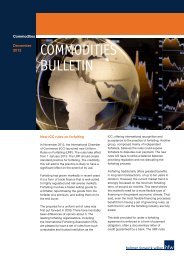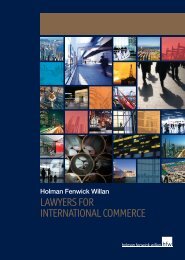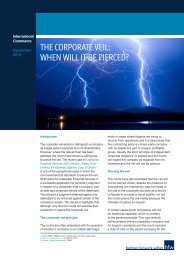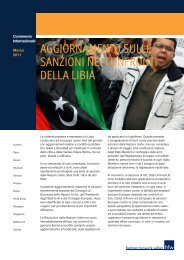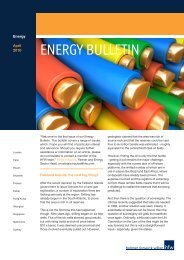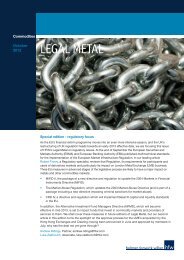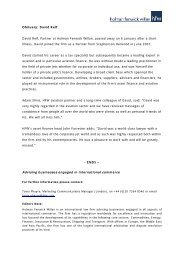Create successful ePaper yourself
Turn your PDF publications into a flip-book with our unique Google optimized e-Paper software.
Insurance/<br />
Reinsurance<br />
August<br />
2012<br />
REVISION TO THE OFFSHORE<br />
CONSTRUCTION POLICY<br />
This article first appeared in the July 2012 issue of Middle E<strong>as</strong>t Insurance Review and is reproduced<br />
with their kind permission. www.meinsurancereview.com<br />
New international terms of insurance may<br />
soon be coming out in the London market<br />
which is likely to have a profound effect<br />
on any oil and g<strong>as</strong> company planning<br />
construction work in the Middle E<strong>as</strong>t moving<br />
forward. This will change the product<br />
landscape available to energy insurers and<br />
brokers active in this area. This is especially<br />
relevant to the Middle E<strong>as</strong>t given the v<strong>as</strong>t<br />
number of energy construction projects<br />
currently planned in the region over the next<br />
five years.<br />
Since 2009, the Joint Rig Committee (JRC)<br />
at Lloyds h<strong>as</strong> been working on revisions of<br />
the standard 2001 Offshore Construction<br />
Project Insurance Wording (WELCAR). On<br />
30 September 2011 the JRC rele<strong>as</strong>ed the<br />
new WELCAR wording into consultation with<br />
brokers, <strong>as</strong>sureds, adjusters, International<br />
Marine Contractors Association and lawyers.<br />
Publication w<strong>as</strong> due in January 2012 but h<strong>as</strong><br />
been delayed pending further consultation with<br />
the market, which is likely to result in further<br />
revision.<br />
The aim of the new wording is to reflect ten<br />
years of underwriting experience on the<br />
b<strong>as</strong>is of WELCAR 2001 and to improve the<br />
quality of the wording by bringing greater<br />
clarity and consistency through the use of<br />
more contemporary language. However, there<br />
are issues arising from the latest published<br />
wording, some of which may sound technical,<br />
but many of which could change the traditional<br />
cover in some ways which may go further than<br />
the Middle E<strong>as</strong>tern operators and their insurers<br />
might anticipate, and we have attempted to<br />
explain some of these below.<br />
WELCAR 2001- well received by insurers<br />
Although WELCAR 2001, the current wording,<br />
is not a perfect policy and h<strong>as</strong> often been<br />
varied or extended by agreement, it are well<br />
established and remains the principal form used<br />
in offshore construction cover. Consequently,<br />
<strong>as</strong>sureds, intermediaries and the market<br />
understand what it meant, which in turn<br />
provides a degree of certainty and stability,<br />
making it user-friendly, practical product. The
form provides a breadth of coverage<br />
to meet the needs of the <strong>as</strong>sureds,<br />
whilst providing built-in protections<br />
for insurers. It is also the b<strong>as</strong>is on<br />
which <strong>as</strong>sured’s contract with their<br />
contractors and sub-contractors on<br />
offshore projects. Whilst numerous<br />
issues <strong>as</strong> to coverage have arisen<br />
under WELCAR 2001, these have<br />
usually been resolved without<br />
recourse to proceedings, which is<br />
a reflection of the sturdiness of the<br />
product.<br />
The new WELCAR wording runs to 59<br />
pages, compared with 31 pages of<br />
the existing one. Generally speaking,<br />
the new WELCAR wording, whilst<br />
seeking to clarify matters, appears<br />
more restrictive of the coverage<br />
provided, making for a less generous<br />
policy for the <strong>as</strong>sured.<br />
We therefore outline below our<br />
comments on some of the proposed<br />
changes which we feel require<br />
careful consideration. This is not an<br />
exhaustive list, but includes what we<br />
think are the main changes.<br />
Scope of insurance<br />
The policy language h<strong>as</strong> been<br />
strengthened with a new requirement<br />
that the list of activities covered<br />
under the policy must be included<br />
within “declared” values and the<br />
coverage for initial operations is no<br />
longer included in the these activities.<br />
This could cause problems unless all<br />
activities are properly listed.<br />
Declarations<br />
A limitation h<strong>as</strong> been introduced so<br />
that those drafting contracts with<br />
“Other Insured’s” must expressly<br />
give the benefit of the insurance<br />
to them. This raises the possibility<br />
that some contractors may not be<br />
insured where an inadvertent error<br />
h<strong>as</strong> occurred in not conferring the<br />
benefit or <strong>as</strong> a result of ambiguous<br />
language. 3. Definitions Although<br />
“Defective Part” is defined, “Part” is<br />
not. This h<strong>as</strong> been the crux of issues<br />
in respect of the <strong>as</strong>pect of coverage<br />
and remains an issue.<br />
General conditions<br />
“Special Conditions Applying to<br />
Other Insureds”:<br />
Clause A is restrictive in terms of<br />
cover for contractors during the<br />
“Maintenance Period”, during which<br />
time contractors will need to be<br />
careful to have their own cover for<br />
situations that may arise, but are not<br />
covered by this policy.<br />
Clause B restricts cover for any<br />
“Other Insured” where “any act or any<br />
failure to act (whether before or after<br />
the Period of Insurance commences)<br />
by or on behalf of the Principal<br />
Insured which prevents recovery<br />
by the Principal Insured...or would<br />
prevent recovery”. This seems overly<br />
onerous, particularly in relation to<br />
actions prior to the commencement<br />
of coverage.<br />
Clause D states that the rights<br />
of “Other Insureds” can only be<br />
exercised by a “Principal Insured”.<br />
This suggests that any failure on<br />
the part of the “Principal Insured” to<br />
comply with the conditions precedent<br />
could prevent cover for other<br />
insureds. This could lead to disputes<br />
between contractors and their subcontractors.<br />
There is a significant change under<br />
“Due diligence” <strong>as</strong> new duties<br />
in respect of due diligence and<br />
compliance are placed on the<br />
“Principal Insured”, their contractors<br />
and sub-contractors. QA/QC h<strong>as</strong><br />
been replaced by these clauses.<br />
These requirements could be<br />
very onerous and might require<br />
contractors to incre<strong>as</strong>e their own<br />
cover.<br />
“Survey Requirements” are stated to<br />
be a condition precedent to liability.<br />
A compliance obligation is placed<br />
on the “Insureds”, meaning that<br />
a technical breach by any “Other<br />
Insured”, for example, h<strong>as</strong> the effect<br />
of removing cover for all insureds.<br />
This is an extreme remedy leaving<br />
other insureds potentially insured.<br />
“Notification Of An Occurrence<br />
Which May Result In A Claim” is now<br />
expressed <strong>as</strong> a condition precedent<br />
to liability and therefore breach of this<br />
will absolve insurers of liability. This<br />
is new.<br />
“Waiver of Subrogation Rights” is<br />
removed where an “Other Insured”<br />
is not entitled to policy cover for<br />
an event of loss, damage, liability<br />
or expense. This waters down<br />
the hold harmless principles that<br />
are incre<strong>as</strong>ingly agreed between<br />
principals and contractors, and <strong>as</strong><br />
such it is not a practical clause and<br />
will likely be rejected by <strong>as</strong>sureds and<br />
contractors.<br />
Section one<br />
“All risks” coverage h<strong>as</strong> been<br />
removed from the “Insuring Clause”,<br />
creating a limitation. It incre<strong>as</strong>es the<br />
burden of proof on “Insureds”.<br />
“Minimising Losses/Additional Work<br />
Required” replaces “Sue & Labour”<br />
language under limited cover, but<br />
the costs to be borne by insurers<br />
02 Insurance/Reinsurance
are only for a proportionate amount<br />
and capped at 50% of the value at<br />
the time. The allocation of proportion<br />
across respective interests will<br />
be problematic. This clause also<br />
provides that insurers will not pay<br />
for the cost of “imminent Physical<br />
Loss of or Physical Damage” arising<br />
from a “re<strong>as</strong>onably foreseeable”<br />
cause. Imminent loss/damage<br />
must necessarily be re<strong>as</strong>onably<br />
foreseeable and whether something<br />
will be deemed “imminent” is a<br />
matter of fact and degree, which<br />
leaves scope for disputes.<br />
As to additional exclusions, the<br />
exclusion of “costs of repairing,<br />
correcting or rectifying wear and tear,<br />
gradual deterioration, “scouring” is<br />
new.<br />
Also, the Defective Part exclusion h<strong>as</strong><br />
been broadened to include “defect in<br />
plan or defect in specification”.<br />
General<br />
The new WELCAR wording h<strong>as</strong> been<br />
produced with the best of intentions,<br />
and it w<strong>as</strong> time to upgrade it.<br />
However, if this version comes in <strong>as</strong><br />
it is or similar, it will have far-reaching<br />
effects for the insurance programmes<br />
of all energy operators and their<br />
sub-contractors in the Middle E<strong>as</strong>t,<br />
in relation to construction projects<br />
throughout the region and beyond.<br />
Many people feel that the revisions<br />
amount to a rewrite of the policy<br />
wording which is much too long,<br />
proposes a considerably narrower<br />
form of cover, and with more hurdles<br />
to overcome to secure cover. It also<br />
significantly incre<strong>as</strong>es the scope<br />
for commercial disputes between<br />
contractors, for example where the<br />
fault of one sub-contractor leads<br />
to the complete loss of insurance<br />
cover for all the others involved in the<br />
project.<br />
The inclusion of all the new<br />
conditions precedent makes it a<br />
much more onerous policy under<br />
English law, since a technical breach<br />
of any of these may result in a right<br />
for the insurer to terminate cover<br />
even where this did not cause any<br />
loss.<br />
Changing the contract regime creates<br />
problems where existing projects<br />
are utilising WELCAR 2001, and<br />
uncertainty, since people prefer to<br />
use a tried and tested system.<br />
There is therefore concern that<br />
energy companies and contractors in<br />
the Middle E<strong>as</strong>t and elsewhere may<br />
seek broader coverage elsewhere<br />
if further amendments are not<br />
made, and uptake of the policy will<br />
be limited. Following some strong<br />
criticism from potential users and<br />
an upcoming second consultation<br />
ph<strong>as</strong>e, we understand that the latest<br />
wording is likely to be substantially<br />
changed before becoming a settled<br />
wording. Nonetheless, the above<br />
gives an idea of the current status of<br />
WELCAR 2012 and the types of issue<br />
which can actually arise whenever a<br />
new wording is introduced.<br />
For more information, ple<strong>as</strong>e contact<br />
Paul Wordley, Partner, on<br />
+44 (0)20 7264 8438 or<br />
paul.wordley@hfw.com, or<br />
Jonathan Bruce, Partner, on<br />
+44 (0)20 7264 8773 or<br />
jonathan.bruce@hfw.com, or your<br />
usual <strong>HFW</strong> contact.<br />
Insurance/Reinsurance 03
Lawyers for international commerce<br />
HOLMAN FENWICK WILLAN LLP<br />
Friary Court, 65 Crutched Friars<br />
London EC3N 2AE<br />
United Kingdom<br />
T: +44 (0)20 7264 8000<br />
F: +44 (0)20 7264 8888<br />
© 2012 Holman Fenwick Willan LLP. All rights reserved<br />
Whilst every care h<strong>as</strong> been taken to ensure the accuracy of this information at the time of publication, the information is intended <strong>as</strong> guidance only. It should not be<br />
considered <strong>as</strong> legal advice.<br />
Holman Fenwick Willan LLP is the Data Controller for any data that it holds about you. To correct your personal details or change your mailing preferences ple<strong>as</strong>e<br />
contact Craig Martin on +44 (0)20 7264 8109 or email craig.martin@hfw.com<br />
hfw.com



